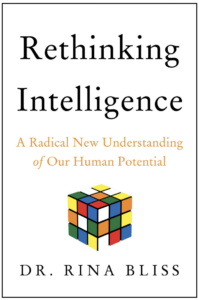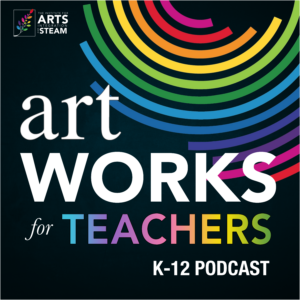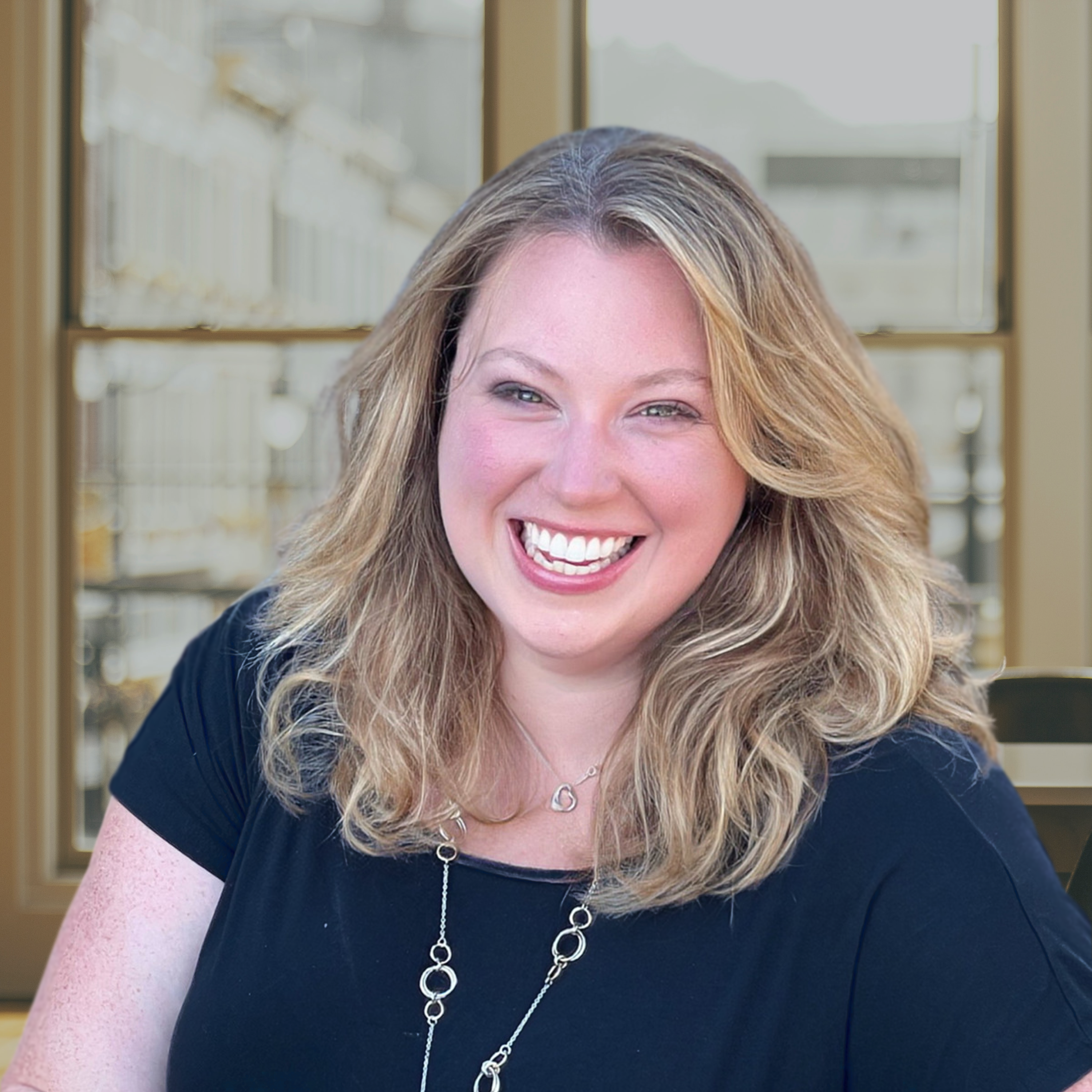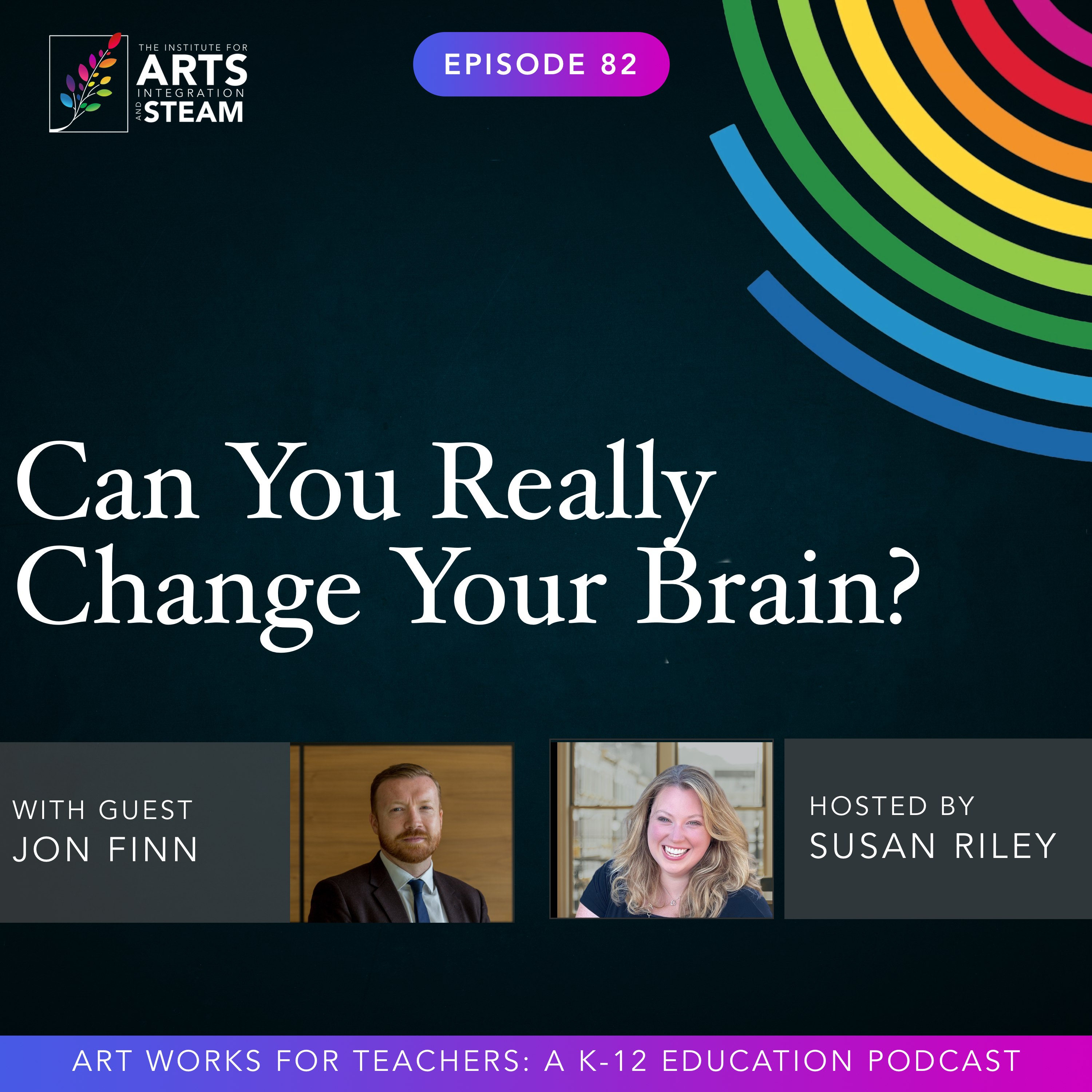ART WORKS FOR TEACHERS PODCAST | EPISODE 049 | 30:22 MIN
Rethinking Intelligence
Purchase Dr. Rina Bliss’ book, Rethinking Intelligence.
Susan
All right, welcome, Rina. Thank you so much for joining us on the podcast today. Of course, of course. So if you wouldn’t mind, if you could tell us a little bit about yourself and your work in general, and then maybe about how you came to write this awesome book, Rethinking Intelligence, that would be great.
Rina
Thank you for having me. Okay, great. Yeah, I mean, I am Rina Bliss. I’m a professor. I teach at Rutgers University. That’s in New Jersey. And I also have three children. So I’m an educator. I’ve been a teacher in the past. I did an AmeriCorps program when I graduated from college. And so, you know, I’ve been kind of in the schools and in different school districts. My kids… go to school in the town where I live, which is Princeton. So Princeton Unified School District, I’ve got three children. Two of them are actually in that district now, and then one of them will go after next year. So I’ve got three little kids. And so yeah, that’s kind of the who I am right now. But I came actually from a really big school district, which is the LA Unified School District, and I am…
I grew up in LA and I came up from a very, very diverse immigrant community in Los Angeles. It was kind of the beginning for me with this project actually because for the people in my community, the parents who are working very, very hard, usually doing things that they weren’t educated for wherever they came from, they were doing some other type of work. My mom, for example, started out here, you know, cleaning people’s homes, being a maid, being a live-in maid, that kind of thing. She was wanting to be a teacher actually, so she had studied, she was interested in child psychology and all of that kind of stuff, but came here and then had to shift everything into make ends meet work. And so for parents like my mom, she’s from Indonesia, so that’s where we were coming from. And so…
It was, you know, testing and education and like scoring high and doing well in school was kind of the way to access the American dream. It was a really big deal for, for them. Um, and you know, and so like every time that there was a test, I took my first test, um, when I was five years old, it was to get into a magnet school and I failed the test. And so it was really devastating for us because, um, because it was just like.
Am I not gonna amount to anything? Like, is she not smart enough? You know, is she not that smart? You know, where is she going with this? And so it was really like, you know, all of the things that I ended up writing about in Rethinking Intelligence were really kind of germinating from that point on where I was like, you know, there’s something going on here and I don’t know what this means. I really, you know, was told that intelligence was something you were born with, and I believed it. My test scores going forward, so a couple years later I should say that I tested into the gifted program in my elementary school, so I was there, you know, from there tracked for college education or higher education. But my test scores were still all over the place, and one of the areas that I was particularly, you know… deficient in was vocabulary. And I really thought like, oh, well, that’s because I’m just not good at that. You know, I’m not born with that kind of, you know, whatever you need in your brain to be good at vocabulary. I didn’t think like, oh, well, my mom’s not from, you know, here and she doesn’t know the language the way that a native speaker knows the language. And we don’t speak in the household in a way that sounds like how people speak outside of our household, you know. So.
It’s like those kinds of things that got me kind of questioning. But it wasn’t until I got to college that I started to actually apply scientific reasoning to any of the questions and the kind of weird feeling I had about all of this stuff. And at that point, I was studying race. And that was an easier leap for me to make because my dad’s from, he has all kinds of European backgrounds in his, you know, heritage and then my mom is like, you know, Asian, Southeast Asian, all different kinds of Asian. And so, like I already knew that there was something weird about saying that a person is like half something and half something else, cause I’m not like half this or half that, right? And you know, and also like, you know, the, there were stereotypes applied to me as an Asian woman of color. And then there were stereotypes that were applied to me as like a white person, you know? And so I was like, all of this is just like, you know, this isn’t right, something’s wrong about this. So it was easier for me to make that leap, but as I started to get into studying race from a scientific perspective, I saw that a lot of the kind of, you know, stereotyping that we do comes from this, this like urge to say that people are of different intelligences, right? And having, you know, ranking differently on, you know, these tests and everything. And so.
It was really through that kind of scientific analysis that I eventually came to the point where I was like I’m gonna write a book on intelligence And I thought you know this isn’t something that I can keep for us Scientists and us you know scholars and in the academic community like this is something that everybody needs to hear
Susan
Absolutely. And I think it’s so interesting hearing your story because I remember that my ancestors are very much Germanic heritage all the way through, but I grew up in poverty. And my grandmother, my grandfather and grandfather came from a place called the Cove in Pennsylvania. I think there might’ve been like 12 families in the Cove and you walked out barefoot, right? And so when I grew up, very similarly to you, for her, you know, testing, getting in good grades was so important. I remember taking tests with her in the summer. She would give me like math fact tests that we would have to sit down and do, right? Because, and like you, I was tested for, not for magnet, but for gifted, didn’t make it the first time. And it was devastating to her. Like for her, she felt like a grade on the report card meant something, right?
And so for me, I’ve constantly strived for that level of perfection and it’s interesting to watch, you know, your own evolution, but then also, and I don’t know about you, but like I have a sibling who has a different kind of intelligence. He’s very much spatially aware. If you give him something to build, he can figure it out in a way that I just can’t, but he’s not great at the reading and the writing skills and so he was placed lower and that was hard for me to watch. And as an educator, I’m sure that you’ve seen this happen, right, whether people are meant to or not and we keep, I feel like we keep this cycle going. So could you share with people for who, if they haven’t read your book, can you give them the basic premise around intelligence and then
Rina
Definitely. So the first thing is that I introduced a kind of new way of defining intelligence. So I mean, the book moves through different kind of histories and present day facts about education and stuff like that. But at the heart of it, there’s this new definition. And that is that instead of seeing intelligence in terms of test scores or innate biology, DNA, what have you, seeing it, especially like seeing it as a number, you know, seeing it as you getting information and interacting with your environment. And so it’s something that we, you know, when you actually look at, so I’ve done a lot of like, you know, studies of the different fields of DNA science that have emerged in the last like 20, 30 years. And so if you look at all of these different kinds of subfields and all of that,
What we’re finding is that humans are all completely different from one, from one another, like you and your brother, right? It’s like siblings, everybody we’re all, we think differently. We use our minds differently. But one thing we all do is that we all get information from our environments and we all use that information to kind of improve our situation. Right? So we like get, we get information, we bring it in, we match it to what we know, we think about it, and then we do something we act upon, whatever we’re learning, right? So that’s why I really, with this book, I’m redefining intelligence, saying it’s about learning from your environment, it’s about learning. The most helpful thing that you can do is become aware that you’re doing it. And become confident in the fact that you are doing it. Like you don’t even need to do anything new, you know? It’s like a lot of people are gonna sell you kind of these ideas of like, if you just do this or do that, you know, you’re going to be smarter. You’re going to be, it’s like, I’m like, no, instead of thinking of all that, all those rankings and stuff, just think what are we built to do? We are naturally built to get information and reflect on it and make a choice, do something with that information. Um, the other sub piece of it though, is that it’s really our environments that are providing that kind of opportunity for us and our environments are unequal. So we really need to consider things like the classroom, but also our home environments, also just the general environment of education policy and what that does for all of the institutions that we move through. For me, I have my family who are going to school, I also am in school because I’m teaching in school, in the school systems. And so it’s like, they’re just, we’re awash in the importance of thinking about these environments and whether they’re nurturing us and whether they’re nurturing like everybody or they’re just kind of privileging some people to go forward and feel like they’re going to be successful with their lives.
Susan
Yeah, one of the big takeaways for me from your book was this idea that you’re not born smart, right? And I think that was such a paradigm shift for me and it sounds silly as an educator. And I believe, I think before reading your book that I was cultivating students’ abilities and understood that you have different kinds of intelligences, but this idea that you’re not born with the smart label, your genetics don’t necessarily determine that for you. That was really eye-opening for me. Yeah.
Rina
I’m glad to hear that. Yeah, I mean, especially like that you can use it as an educator, you know, and that teachers can use that information to kind of think about, you know, their students differently because it’s like, yeah, we think like, oh, you know, some of these kids are just smart and some of these kids are less so, and you know, like, yeah, I wanna support them, but you know, I guess we’ll, we’ll move them into a different stream, you know, and we’ll focus our energy on the ones that are easier because they’re really obviously going to college and whatnot, and it’s like when you remove the word intelligence from that system of ranking, and you say like, I’m not about to rank these people, you know, then you can just say, okay, how can I empower them to learn from their environments? They’re gonna learn in different ways because we all do.
Susan
Yes. Yes!
Rina
But how can I empower them to do that? And we can get into it more, the different strategies that I discussed, but it’s like what types of learning activities do I want to give them? What kinds of opportunities to connect with other people who think differently than they do and who have strengths versus weaknesses that match or don’t match them and mirror certain qualities in them and also like push and help push them up. Those are the kinds of things that I think teachers need to be thinking about when they, hopefully people will read the book and kind of get their own favorite bits of it, but also just like in general, I think that everybody needs a little bit of reflection on can I actually even think about intelligence in a classroom without thinking about the ranking and thinking about these people are better, these people are worse.
Susan
Well, and we’re in such a testing culture, right? This is something that teachers talk about all the time, rankings, testing, data culture. And one of the things that you share in the book is that test scores don’t tell us how smart we are, right? And yet we’re still using these measures. And I’m curious, what do you say to people who are like, well, if we give an IQ test to someone, are you saying that doesn’t matter, that doesn’t really measure their intelligence and if so, then why are we even still using it? So I’m curious as to what your response is for those.
Rina
So I mean, I have a kind of radical view on IQ tests. I just think that they’re so loaded with so many problems. And it’s not just the history. It’s like present day uses. It’s like the way that we track based on the tests. So it’s like we could just have people taking tests and have that information, whatever. But we actually do something with that information. We push students forward, or we pull them.
back in a sense, right? We place them somewhere else, right? And so I feel like it’s too fraught. I’d rather not have them at all. Now, I do also feel sensitive and understand that an empathetic towards parents who have neurodivergent kids that want to kind of figure out what type of learning environment might suit them better. And if a traditional classroom isn’t cutting it for them and they, you know, take an IQ test and that just shows them that their kids are, you know, um, performing well at certain types of verbal and mathematical kind of, you know, or quantitative kind of reasonings. Um, then I understand why they would want to use that to get them placed somewhere. But I think that, um, the problem is that it’s very fuzzy and in from state to state, it’s different how, and from district to district, how people actually use these tests. So on.
On whole, I think it would be better to have other kinds of tests if we’re going to do tests, right? So IQ tests, I think are like the kind of, you know, lowest common denominator or something. You know, they’re just not useful to me. I think that taking tests for specific kinds of, you know, ways of thinking and, you know, going closer to the measurement of things like memory, things like working memory, things like retrieval of ideas and very specific cognitive tests that I write about in the book. Those kinds of things I think are more useful so that you can just say, okay, these are the things that this person actually is going to need help with, and these are the things that they’re not going to need help with. And as opposed to just being like, here is this standardized test that was developed to really just track people for gifted education versus special needs classrooms.
Susan
Right. And keeping them on those tracks, I think that’s one of the most poignant pieces is that we don’t retest, right? Like, so we take the lane for them, and then they’re stuck on that lane, whether or not they grow. And so I think that brings a really important point because if intelligence isn’t genetic, but is rather really a process, which is what you’re sharing, right? So how do we cultivate intelligence as educators? How can we offer some of those opportunities to build intelligence?
Rina
Well, I think that the first thing is to really move away from the kind of like, here’s the information and here’s the test. Here’s what you need to memorize and here’s what you need to show me. That kind of like performance mentality, which leads us to the score mentality to basically divest in that and get us into a system where we’re really doing problem-based learning.
And we’re really letting kids of all different, you know, present moment capabilities to, you know, engage with the material in different ways and to learn in their different ways, right? So some kids are going to learn better from communicating and having a conversation about new information or new skill sets. And some kids are going to, you know, do really well at reading or reading aloud. And, you know, I… I mean sometimes I test these kinds of ideas with my own three children and have you know Just look and see it like how does it feel and how are they doing when they are? You know someone’s kind of being tasked to kind of like read to the others How is it? How does it feel when they’re doing the same learning the same kind of? Thing through some kind of role play or some kind of playing out like you know different roles of being different characters in society or, you know, what if we learn the same material by going outside and doing something, you know, together like making, creating something. And so I think that having as much project and problem-based learning as possible already starts things in the right place. And one of the things that I really focus on in one of the chapters of the book is,
Connected learning so just the kind of learning that is done either in you know a dyad or in you know a group setting just changing it from being like here’s your sheet of Mathematical equations that I want you to like you know do and then show me who did them, right? And then we’ll test you on it later, and then we’ll know who’s good at math. Not like having the students be interactive with all of that learning. The same kinds of reasoning, the same quantitative reasoning is going to emerge, but it’s going to be through conversation, through interaction, and through emotion, through connection, through having that feeling like we’re both learning something, we’re both doing this, we’re both arriving at the answers together, right?
Susan Riley
Yeah, yeah, absolutely. Now what do you say to educators who are like, I don’t have time to do all of that because I have this curriculum that I have to get through and this is what it’s telling me, right?
Rina
Right. And I mean, you, you can only do what your task to do. I, I feel also, I feel empathetic towards the teachers who are, you know, because I am also a person who has to listen to what my department and what my university and what my school and all of the, you know, like, um, there, there are so many layers of administration that are above my head. Right. And I have to do certain things. I don’t have a choice about whether I assess my students or not, like I can’t just not assess them. So there has to be some kind of exam, you know what I’m saying? So it’s like, there are ways that we as educators just have to do certain things to work our jobs, right? But in any way possible that, you know, when possible, when I can push back on the system, I do. In any way possible, if I’m in a meeting and I’m hearing something about, for example, in the last, I guess, I’d say the last four or five years, there have been a lot of conversations in the departments that I’ve worked in about the GREs, which are the graduate school, to get into grad school, our standardized test. And so, you know, we’ve had a lot of conversations about, should we get rid of them? Should we keep them? And in both of the departments that I worked at, you know, pre-pandemic and then, you know, now, since then, I was like, get rid of them, you know? So it’s, I’m just one person, but I can stay that. And we actually did get rid of them. So, you know, things can change, you know, even with one person out of whatever, like 25 people or something saying, making a case. And um, when, when you can say something to the powers that be, and also, you know, in any way possible with whatever tiny little bit of energy you do have to, to do some kind of creative move with that curriculum to make it a little bit less rigid and to make it a little bit less score based, you know?
Susan
Yeah, absolutely. And I love that idea of getting creative with your curriculum is certainly what we promote here. So I’m curious though, based on your research, what role the arts can play in helping to cultivate the intelligence process.
Rina (22:16.663)
I think the arts are the prime way that we can create this project-based and problem-based learning. Because by definition, there is a connectivity in creating artwork, also in sharing your artwork, in doing and creating art together, in creating plays for example. That’s something I used to like to do when I was teaching little kids. You know, it was just like putting on plays. I know a lot of teachers are elementary school level, like to do plays and doing creating, you know, dances. I remember one that I hold close to my heart is at an elementary school in San Francisco that I worked at, creating a like a performance based on the blues, you know, so that like students could learn about the blues and also these kids were nine, eight, nine years old and you know just having them learn about that and then also bringing that to the rest of the school and like infusing the school culture with that and all so it’s like you know just having these ways that they’re you know they’re reading some information, their learning history, their, you know, there’s ways to integrate numbers into that kind of thing as well, and time keeping time, and you know, and then yet, they’re doing something together and they’re all synergistically really like learning and enjoying and having like a connection to it. You know, all those kids in that particular, you know, classroom and with that performance felt very, like proud and also very hooked into the material that we learned, right? And so I think that the arts are a really beautiful way to enact some of these things that I’m talking about.
Susan
Yeah, I couldn’t agree more. We talk about this a lot in that when you use arts integration as a methodology that students who are not labeled traditionally as intelligent can shine in a way that they might not be able to in other arenas and showcase their true intelligence. So I think that’s so important. So thank you for confirming that. I’m curious, where can people find you and stay in touch because you have done such fascinating research and you have so much to share. I want them to be able to find you and continue to follow you.
Rina
Yes. Well, you can follow me on socials. I’m always Dr. Rina Bliss. Sometimes there’s a period. Most of the time there isn’t. So, you know, that part of it is funny, but, um, Dr. Rina Bliss, you know, I’m on all of, all of the different platforms. Um, I’m, I’m definitely, you know, mostly, most focused and my heart is, is deeply in, in tick tock and Instagram at this moment, you know, but, um, so definitely if you’re going to follow me one place, it’s like, you know, go, go there.
But I also have a website where I have a blog. I’m going to be changing, or not changing, but like opening up the blog to a Substack. And so there will be that too, eventually. Probably by the time that this airs, you can go look for me on Substack too. The website is drreanabliss.com, so it’s easy to find me. The book you can buy anywhere, at any bookstore.
And I know that you can also, I would prefer that people go through independent booksellers, but you can order on Amazon, you can order online, you can order on HarperCollins website as well. And then you can always just message me, anytime someone wants to DM me with ideas, I am always asking, I have a newsletter, I’m always asking people to message me with their ideas and with their experiences and you know, send me photos and everything like that. So really like feel free to always email me, Rina Bliss, and you can always find me. Yeah.
Susan
Fantastic. Well, we’re going to link that in the show notes so that everybody can find you and continue to follow your work. That would be wonderful. Thank you so much for coming and joining us today. I have had such a wonderful time learning from you, and I’m sure that our audience will as well. I appreciate you and the work that you do so much.
Rina
Great. Thank you. Thanks, Susan.
Susan
Of course.

